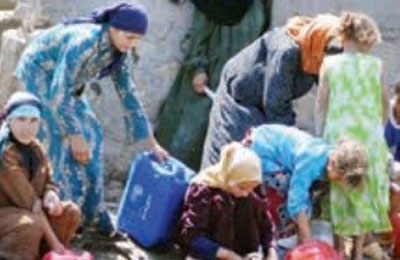
100 natural disasters ‘could strike in the Arab region’
MANAMA, May 7, 2015
More than 100 'natural disasters' could strike in the Arab region in the next four years because of climate change, according to a new report.
The Arab Sustainable Development Report 2015 predicts that disasters such as earthquakes, floods and storms will affect more than 210 million people in urban centres between 2010 and 2019, said a report in a Gulf Daily News (GDN), our sister publication.
Issued by the United Nations Environment Programme, United Nations Economic and Social Commission for Western Asia and regional experts, it documents less than 200 extreme climatic events between 2010 and last year '“ but says the figure will increase to more than 300 by 2019.
“Over the past several decades, the region has witnessed an increasing trend in natural disasters, with corresponding increases in human and economic losses,” stated the report, which was released in Bahrain on Tuesday.
“Droughts are now impacting tens of millions of people and are expected to continue to do so for the foreseeable future.”
The report was released during the Arab High-Level Forum on Sustainable Development, which ends today at the Ritz-Carlton Bahrain Hotel and Spa.
Warning
The report warns that floods and storms will particularly affect remote rural regions, while Bahrain is one of six Arab countries at risk from increasing sea levels.
“Sea level rise will threaten life and infrastructure in coastal areas over the coming decades,” stated the report.
However, this coincides with concerns over a fresh water shortage '“ with almost half of the Arab population suffering from water scarcity.
The report warned that 18 of 22 Arab countries, including Bahrain and the other GCC countries, fall below the water poverty line of 1,000 cu m per person annually.
It said high population growth rates and rapid urbanisation is putting increasing pressure on water resources and that by 2025, the Arab region is expected to have its lowest annual per capita water resources since 1960.
“The Arab region faces severe water, food and energy insecurities that threaten social foundations and existing development gains,” warned the report.
“The situation is further exacerbated by unsustainable consumption and production patterns that have seriously depleted the region's natural resources and affected the quality of life,” it pointed out.
UN resident co-ordinator and United Nations Development Programme resident representative Peter Grohmann yesterday described one of the biggest challenges facing the region was changing attitudes of the people.
“There is a cultural and customs struggle we need to address when it is related to water resources and energy,” he said.
“We need to work to change these habits.”
Other key challenges facing the Arab region highlighted in the report include a housing shortfall, estimated at over 3.5m houses, and high unemployment among young people.
The region as a whole is also placed well below the international poverty line of $1.25 per day.
Persistent conflict is also hindering development, with 41 per cent of all Arab countries suffering at least one form of conflict during the five-year period from 2009 to 2013 - one of the highest rates in the world. - TradeArabia News Service







